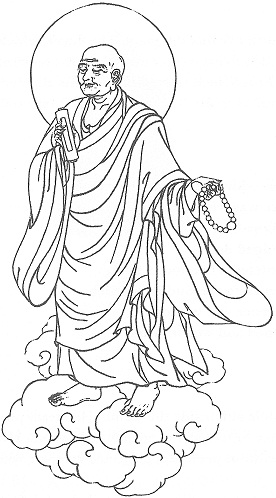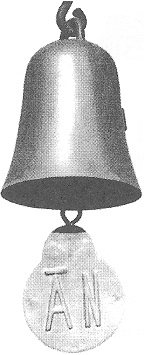|
舍利譯為鶖鷺,以母目似之而得名,弗譯為子。尊者在母腹中,即具辯才,其舅無法辯勝其母,知有智人。八歲時能登坐,論議無雙,博學多才,辯勝五天竺十六國之大論師。一日,途遇馬勝比丘,被其威儀莊嚴所感,而生欣慕。問:「汝師何人?」曰:「釋迦牟尼佛。」又問:「所學何法?」曰:「緣起法。」所謂「諸法從緣生,諸法從緣滅,我佛大沙門,常作如是說。」尊者生歡喜,皈依佛門,於七日內,通達佛理,故稱為智慧第一。遇佛說法時,代眾請法,唯有阿彌陀經例外,不問自說,為當機者。又隨文殊至維摩處問疾,天女散華,落尊者身,彈之不去,示應迴小向大。小乘獨善其身,大乘兼善天下。
「舍利」翻譯為鶖鷺,因為他母親的眼睛好像鶖鷺鳥的眼睛一樣,所以她生了一個兒子也叫鶖鷺 ── 鶖鷺之子;「弗」翻譯成子,所以鶖鷺之子,在《心經》上翻舍利子,他在母親腹中時也影響他母親成辯才無礙,他的舅舅以前和他母親辯論,他母親常常辯輸,現在她懷孕了,舅舅辯論不過她,他就知道他妹妹腹中的小孩子是有智慧的。舍利子在八歲的時候,就升座和人辯論,沒有人能勝過他,他博學多才,辯勝五天竺十六國之論師,那時候有東南西北中五個天竺分出十六國,十六國的大論師都辯論不過他。
有一天,在路上他遇到馬勝比丘,他看到此人的威儀非常好,所以心生歡喜,很羨慕的問:那一位是你的師父?馬勝比丘說:釋迦牟尼佛。他又問:你學的是什麼法?比丘對他說:我們所學的是緣起法,所說的緣起法就是一切法從緣而生,一切法從緣而滅,我的師父叫沙門,他勤修戒定慧,息滅貪瞋癡,他常常是這樣說法。尊者聽了,心裡很歡喜,於是也拜佛為師父。七日內通達所有佛說的道理,所以智慧第一。佛說法的時後他常代眾請法,祇有《阿彌陀經》例外,此經是佛不問自說,他又跟隨文殊師利菩薩到維摩居士的地方問候,維摩的病。當時天上的天女散花落到尊者的身上,這花黏到他衣服上彈之不去,這是什麼意思呢?這表示應迴小向大,小乘獨善其身,祇管自己,大乘是兼善天下,也是自利利他,小乘祇知道自利。
贊曰
胎中具智 雄辯無倫
論師絺羅 甘拜下風
雖入外道 終歸緇門
聰慧第一 博學多聞
「胎中具智 」:他在胎裡就有大智慧。
「 雄辯無倫」:他的辯才沒有人能相比。
「 論師絺羅」:他的舅舅是當時的大論師拘絺錄羅。
「甘拜下風」:也辯論不過他。
「雖入外道」:雖然他以前是個外道。
「終歸緇門」:他以後還進入佛門做比丘。
「聰慧第一」:他的聰慧是第一的。
「博學多聞」:他又博學又多聞。
又說偈曰
助佛揚化度群倫 常觀自在般若深
五蘊皆空無人我 三毒息滅有佛僧
降心離相破法執 迴小向大悟圓通
現比丘相影響眾 功成身退不居功
 「助佛揚化度群倫」:他是幫助佛教化眾生。 「助佛揚化度群倫」:他是幫助佛教化眾生。
「常觀自在般若深」:他常常自己迴光返照,反求諸己,所以他的般若智慧特別深。
「五蘊皆空無人我」:心經上說:「五蘊皆空,色即是空。空即是色。他無人也無我。
「三毒息滅有佛僧」:三毒息滅了,他才能見到佛,遇到大賢僧。「降心離相破法執」:他能降伏心裡的執著,相也離開了,所以破一切的我執、法執。
「迴小向大悟圓通」:他迴小向大,了悟圓通的道理。「現比丘相影響眾」:他現的是比丘相,做眾人裡的影響眾。
「功成身退不居功」:他所應該做的事他都做了,所以身退,不在佛面前表示自己有什麼功勞。
|
|
Text:
Shariputra was named after his mother whose eyes resembled those of an egret. Therefore, ‘Shari’ is translated as ‘egret’ and ‘putra’ means ‘son’. While the Venerable One was still in his mother’s womb, he was already endowed with eloquence. His uncle had no way to win a debate with his mother and knew that the child was a wise person. At the age of eight, Shariputra was qualified to be seated among the elders during intellectual discourses, in which he always excelled. Erudite and multi-talented, he won debates with all the great philosophers from the sixteen kingdoms throughout the five regions of India. One day, he met Bhikshu Asvajit on the road and was struck by his awesome deportment and adorned appearance. With joyful admiration, he asked, “Who is your teacher?” The latter replied, “Shakyamuni Buddha.” He inquired further, “What dharma do you learn?” “The dharma of interdependent origination,” replied the Bhikshu. As it is said,
“All dharmas arise from conditions; all dharmas cease with conditions. Our Buddha, the great Shramana, always speaks in this way.” The Venerable One was delighted and took refuge with the Buddha. Within seven days, he mastered all the Buddhist principles and was thus known as the one foremost in wisdom. When the Buddha expounded the Dharma, Shariputra usually requested the Dharma on behalf of the assembly and serve as the interlocutor. The only exception was the Amitabha Sutra, which was delivered without request. Furthermore, on the occasion when he accompanied Manjushri Bodhisattva to visit the ailing Vimalakirti, the heavenly maidens scattered flowers, which fell on the Venerable One’s body and could not be brushed off. This was an indication that he should forsake the small and turn towards the great, for the Small Vehicle only benefits oneself whereas the Great Vehicle universally benefits all.
Commentary:
‘Shari’ is translated as ‘egret’. Since his mother’s eyes resembled those of an egret, he was called Egret’s Son.
‘Putra’ means ‘son’. In the Heart Sutra, Egret’s Son is translated as Shari’s Son.
While still in his mother’s womb, he influenced his mother to such an extent that she obtained unobstructed eloquence. In the past, when his uncle debated with his mother, she always lost. Now that she was pregnant, his uncle could not win any debates with her and therefore, he
knew that the child whom she was carrying
was a wise person. At the age of eight, Shariputra was qualified to be seated among the elders during intellectual discourses, which he always won. He was
erudite and multi-talented and won debates with all the great philosophers from the sixteen kingdoms throughout the five regions of India. At that time, India comprised sixteen kingdoms that were divided into the five regions of north, south, east, west and central. None of the great philosophers from the sixteen kingdoms could beat him in debate.
One day, he met Bhikshu Asvajit on the road. At the sight of this person’s
awesome deportment, which was truly outstanding, his heart gave rise to joy.
He asked admiringly, “Who is your teacher?” Bhikshu Asvajit
replied, “Shakyamuni Buddha.” Shariputra
inquired further, “What dharma do you learn?” The Bhikshu told him, “We learn
the dharma of interdependent origination. What this means is that
all dharmas arise from conditions and all dharmas cease with conditions. My teacher is called a
Shramana. He vigorously cultivates precepts, samadhi and wisdom and puts an end to greed, anger, and delusion. He
always speaks Dharma in this way.” On hearing this, the
Venerable One was so joyful that he bowed to the Buddha as his teacher.
Within seven days, he mastered all the principles that the Buddha talked about
and was thus known as the one foremost in wisdom. When the Buddha expounded the Dharma, Shariputra often
requested the Dharma on behalf of the assembly. The only exception was the
Amitabha Sutra, which was delivered by the Buddha
without request. He also accompanied Manjushri Bodhisattva to visit the layman,
Vimalakirti, who was ill. On that occasion,
the heavenly maidens scattered flowers, which fell on the Venerable One’s body. The flowers stuck to his clothes
and could not be brushed off. What was the meaning of this?
This was an indication that he should forsake the small and turn towards the great. The Small Vehicle only benefits oneself and its followers only mind their own business. On the other hand,
the Great Vehicle universally benefits all, which is to benefit oneself as well as others. The Small Vehicle is only concerned with self-benefit.
A verse in praise says:
He was already wise while still inside the womb.
His great eloquence was without peer.
The philosopher, Kausthila,
Willingly acknowledged defeat.
Although he had entered a heterodox path,
He ultimately returned to the Buddhist order.
Foremost in intelligence and wisdom,
He was highly learned and well informed.
Commentary:
He was already wise while still inside the womb: He already possessed great wisdom when he was still in his mother’s womb.
His great eloquence was without peer: Nobody could compare with his debating skills.
The philosopher, Kausthila, willingly acknowledged defeat: His uncle was Kausthila, a great philosopher of that time, but even he could not defeat Shariputra in debate.
Although he had entered a heterodox path, he ultimately returned to the Buddhist order. Even though he was previously an externalist, eventually he joined the Buddhist order and became a Bhikshu.
Foremost in intelligence and wisdom, he was highly learned and well informed: He was number one in terms of intelligence and wisdom. He was a very knowledgeable person.
Another verse says:
Assisting the Buddha to propagate the teachings, he transformed and crossed over the multitudes.
He constantly contemplated at ease by means of profound prajna.
Realizing the emptiness of the five skandhas, he had no ‘self’ and ‘others’;
With the three poisons eradicated, he met the Buddha and Sangha.
By subduing the mind and leaving all characteristics, he broke his attachments to the Dharma.
Forsaking the small and turning towards the great, he awakened to perfect penetration.
Manifesting as a Bhikshu, he exerted his influence upon the group,
He accomplished his tasks and withdrew without claiming any credit.
Commentary:
Assisting the Buddha to propagate the teachings, he transformed and crossed over the multitudes. He helped the Buddha to teach and transform living beings.
He constantly contemplated at ease by means of profound
prajna. He always returned the light to illuminate within and sought everything within himself. As a result, his prajna wisdom was exceptionally profound.
Realizing the emptiness of the five skandhas, he had no ‘self’ and ‘others’. The Heart Sutra says: “The five skandhas are all empty” and “Form itself is emptiness; emptiness itself is form.” He did not have any notion of ‘self’ or ‘others’.
With the three poisons eradicated, he met the Buddha and Sangha: It was only when he had rid himself of the three poisons that he could meet the Buddha and the greatly virtuous ones of the Sangha.
By subduing the mind and leaving all characteristics, he broke his attachments to the Dharma. As he was able to subdue the attachments in his mind and separate from all characteristics, he broke through all his attachments to ‘self’ and ‘Dharma’.
Forsaking the small and turning towards the great, he awakened to perfect penetration: In forsaking the small and turning towards the great, he realized and awakened to the principle of perfect penetration.
Manifesting as a Bhikshu he exerted his influence upon the group. He manifested a Bhikshu’s appearance so as to provide leadership for the group of disciples and exert his influence.
He accomplished his tasks and withdrew without claiming any credit: Since all the tasks that he had undertaken to do were accomplished, he withdrew and did not claim any personal credit in the presence of the Buddha.
|